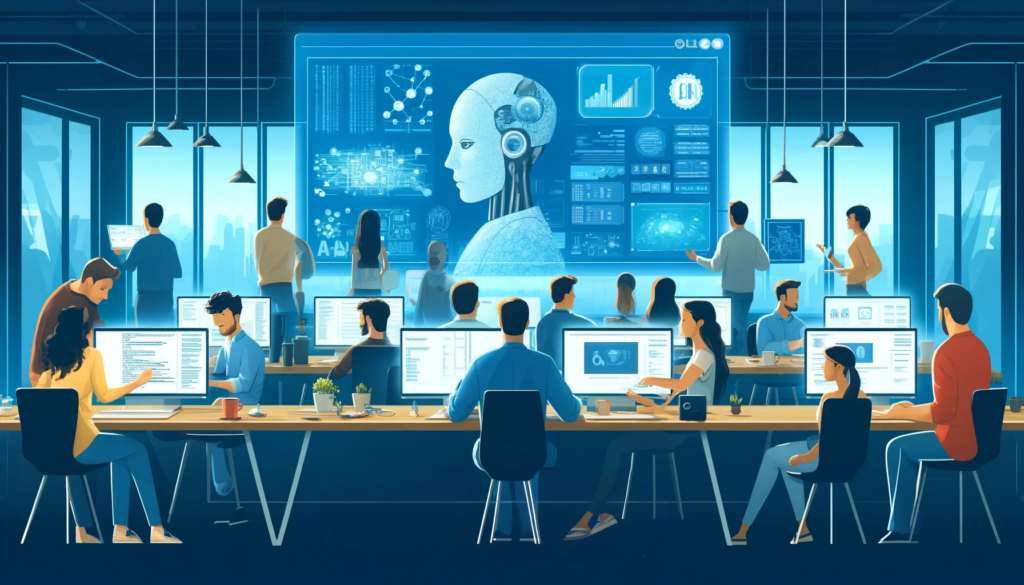Over the last 18 months, the world has gone AI-crazy. ChatGPT launched in late November 2022, and within weeks, it had created a buzz that has continued to gain pace. In the subsequent year and a half, people have started using AI in so many ways, as if AI itself was a brand-new concept. But in reality, AI has existed for quite some time.
ChatGPT launched it into the zeitgeist, but similar technology already existed in the background. It’s fair to say that LLM-based Gen AI was an overnight success years in the making.
Let’s address the elephant in the room—is any of this truly AI? Some may argue that LLM-based (large language model) generative AI models don’t align with traditional AI definitions. However, we’ve got to remember that meanings evolve, just like technology and language.
AI, like ‘the cloud’, has become a blanket term for a broad concept. When I look up, I don’t fear servers dropping from the sky. Similarly, current AI solutions don’t herald the rise of robots, but it’s a convenient and understandable term.
AI Has Been Around For Years
Now that we’ve clarified definitions let’s look at some of AI’s tangible and proven applications, which are already shaping our lives.
AI-Powered Algorithms Help Influence Human Behaviour
Something I often hear mentioned is the use of AI within streaming and social media network algorithms to influence our viewing and purchasing behaviours.
This somewhat emotive use of AI can elicit strong feelings; there’s something potentially a bit sinister about a machine tracking your actions and nudging you towards choices. But whether you like it or loathe it, you have to admit it works.
For Years, Chess Engines Were The Public Face of AI
On a lighter note, there are chess computers, or chess engines as they’re known. These are another example of effective AI that has received much attention over the years.
I remember Garry Kasparov, the reigning world champion and arguably the greatest player of all time, easily beating the chess engine Deep Thought way back in 1989. This widely reported matchup seemingly highlighted the ongoing human advantage over machines.
Then in 1997, only 8 years later, Deep Thought’s successor, Deep Blue, shocked the chess world and defeated Kasparov. It’s hard to imagine if you weren’t there, but this stunning achievement was major, prime-time news.
Chess was seen as a yardstick for AI, and this victory was a turning point in public perception. Chess engines have come a long way since then, and today, anybody can download and run incredibly powerful engines, such as Stockfish, on their phone for free.
Once AI Becomes The Norm, It Stops Being Mentioned
I cite the examples above, algorithms and chess engines, to highlight how effective and varied AI can be and to show how far we have come in a relatively short time.
It’s worth noting that you no longer hear talk of chess engines in the mainstream media because not long after Deep Blue beat Kasparov, it just became accepted that AI was a stronger player than even the best human.
How long until we stop talking about AI completely, and it just becomes a given?
AI Is Already Used in Software Development
AI is used in many other less publicised ways, including the area that’s of particular concern to this article: simplifying and accelerating software development.
Within software projects, AI (and ML) is increasingly used in areas including code generation, test automation, and project management, although many of these uses are often not in an officially sanctioned capacity.
I’ll go out on a limb here and state that you’d be hard-pressed to find many engineers who have not used a chatbot for code generation, even if they have to use their own personal machines to do it.
However, as versatile as ChatGPT is, it is not designed for this purpose and will issue warnings stating as much when you use it to generate code. It can help a skilled developer reduce effort, but it needs to be steered by an expert hand.
It’s not just commercial chatbots that are being used in software projects though. Many tool vendors have built AI into their products. OpenText, for example, has done this with UFT One.
Where ChatGPT is a bit of a Jack-of-all-trades, this inbuilt AI functionality is far more targeted, and far more robust.
The Benefits of Generative AI for Software Development Projects
As alluded to above, there are clear reasons why software teams are using AI.
As this Gartner article states, “The benefits of generative AI include faster product development, enhanced customer experience and improved employee productivity, but the specifics depend on the use case.”
These benefits of AI include, but are by no means limited to:
- Eliminating wasted time and effort
- Allowing expert resources to focus on strategic, value-adding work
- Accurately predicting and hitting deadlines
- Reduced risk with increased testing coverage
- Finding and fixing bugs fast with automated testing
Not only is it easy to see why people are using AI, we’re already at the point where it’s hard to understand why people wouldn’t use it.
The time benefits alone are game-changing. Why spend time on grunt work when a machine can do it for you?
However, as useful as functionality like this is, these rudimentary AI approaches barely scratch the surface of the potential benefits that AI can bring to software projects.
Recently, specialised enterprise-grade AI tools have emerged, taking the benefits much further.
Enterprise AI Solutions Can Cut Software Delivery Time By Up To 60%
You’re probably saying something like, “60%, yeah, right!” although potentially with an additional profanity or two.
I reacted similarly when I first read this figure in promotional material for OpenText DevOps Aviator – their AI DevOps platform.
However, when I started investigating DevOps Aviator and its capabilities, the 60% made sense. Don’t get me wrong; 60% is still a big number, but significant savings can be made with tools like this.
Aviator is OpenText’s AI platform, and there are many different Aviator solutions for different functional areas such as operations, customer experience, content, networks, cybersecurity, and DevOps.
As a testing professional, I am most interested in DevOps Aviator. This particular functional solution includes many of the common AI features and benefits we’ve seen for years, albeit more polished and business-ready versions.
For example, AI has long been able to assist with the creation of automated tests, but DevOps Aviator does it in a more sophisticated way than previous solutions. A DevOps engineer can ask Aviator’s chatbot to create a list of tests based on what Aviator knows about the project, and the DevOps engineer selects those they want.
Enterprise AI Solutions Like Aviator Provide Easy Access to Priceless Information
You see, these new enterprise-grade AI solutions do something differently: They constantly learn about your project to understand what is happening and what you might need.
This might sound like a trivial benefit, but imagine how powerful it would be to have a chatbot that knows everything about your specific project.
Rather than having a fragmented and flaky approach to AI, you have a single source of priceless information that helps steer your entire project to success. You can engage with expert-level chatbots whose training data has been specifically selected to optimise software projects.
You can learn more about the benefits of DevOps Aviator by reading this great blog post by Michael O’Rourke. In it, he mentions the following four specific benefits that DevOps Aviator provides:
- Product Owners can generate a quick summary of features for stakeholders.
- Developers can get a breakdown of suggested user stories for a feature.
- QA Engineers can merge existing tests easily by grouping duplicate tests.
- Marketing Specialists can quickly summarise a feature for user-facing content.
Yes, commercial AI solutions are great fun and highly versatile, but they don’t offer the context and specificity of enterprise-level AI solutions. You can’t exactly ask ChatGPT to estimate your project timelines or summarise your feature set.
AI Is The Future of Software Development
Integrating AI into software development is no longer a fantasy; it’s not even a luxury—it is rapidly becoming a necessity.
With chess engines, the conversation ended once Deep Blue beat Kasparov. We’re already moving down that path with software development.
That cat is already out of the bag. Even if companies haven’t officially adopted AI, there’s already a high adoption of AI on an individual level. And while these approaches are effective, they are also pretty basic and limited in scope. Sure, they help shave time off a few tasks, but they aren’t exactly game-changing enterprise solutions.
Increasing Time Demands and Budget Constraints Will Continue to Push AI to the Forefront
Software is increasingly complex, releases are increasingly frequent, and development teams are increasingly up against the clock. We’re rapidly hitting the limits of human capacity, and soon, it will be impossible to deliver projects fast enough without it.
In an era where time-to-market is the difference between success and failure, it’s no longer enough to rely on commercial chatbots to help with a few rudimentary tasks. Projects that want to succeed must deploy enterprise-grade AI tools like OpenText Aviator.
Are you involved in software development and are facing constant battles with timelines and resources?
Get in touch today to learn more about how OpenText Aviator can accelerate your projects!

















